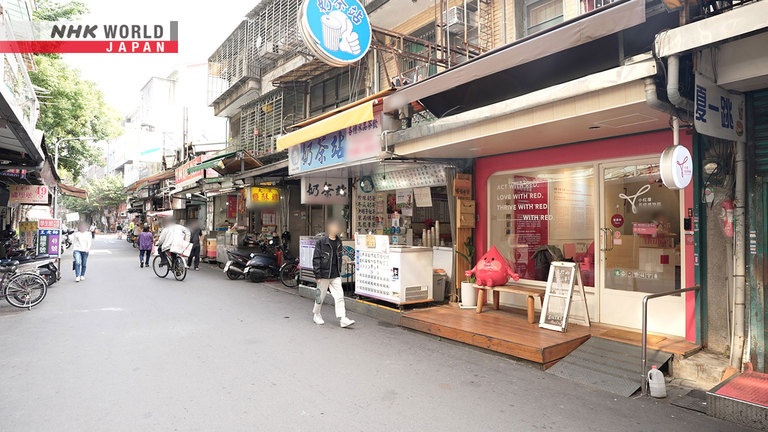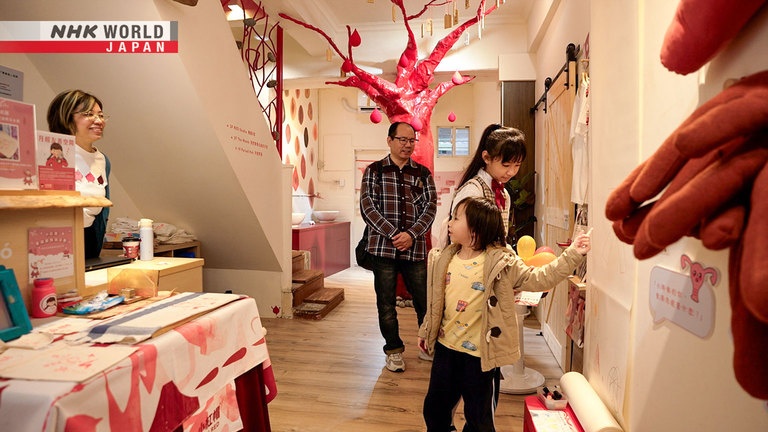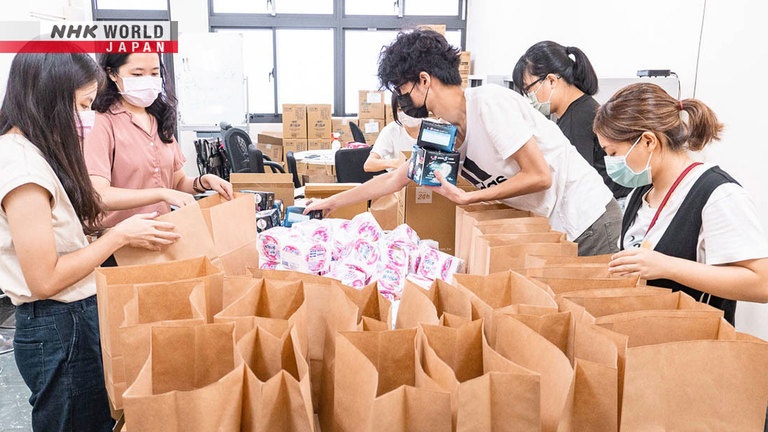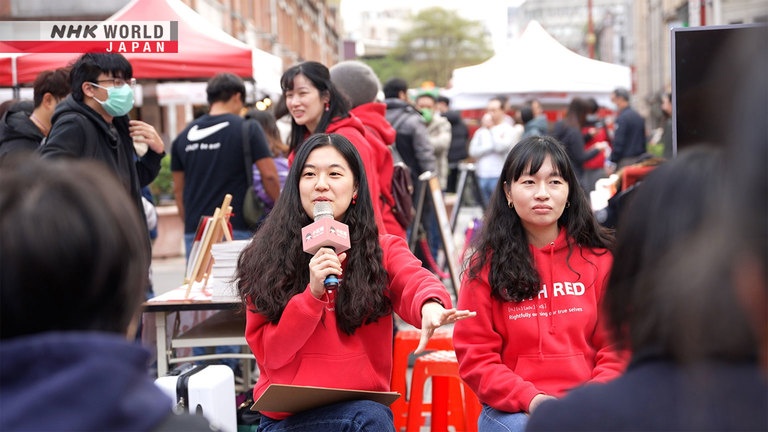Museum for Period Equity: Vivi Lin / Period Equity, DEI and Human Rights Activist
Vivi Lin is the founder of The Red House Period Museum in Taipei. She aims to achieve period equity and DEI by helping people to understand menstruation, an issue that has been regarded as taboo in society.




Transcript
Direct Talk
In 2022, a unique museum opened in Taiwan.
The Red House Period Museum.
This widely lauded facility
is the only of its kind in the world.
The founder is Vivi Lin.
With various forms of discrimination
and prejudice against women
still remaining in many countries
around the world,
she's working toward
a deeper understanding of
and disseminating wider information
about menstruation,
one of the most sensitive of topics.
Museum for Period Equity
In striving for "Period Equity,
I've always said,
"Wherever there are people,
there are menstrual problems."
Because whether or not
you've experienced a period yourself,
there's always someone
close to you who has.
And although only about 50% of the earth's
population may have experienced periods,
I want everyone to understand them.
Lin's aim is to work with other young people
to unearth the untold history of menstruation
and encourage society as a whole to be
more actively concerned with the issue.
Taipei in Taiwan.
The Red House is tucked away
in a shopping alley.
Inside, information that fosters
understanding of how periods occur
and ways that they can be
dealt with is on display.
The exhibits demonstrate the importance
this subject has for us all.
One noteworthy theme is
how periods affect a woman's life.
The workings of a woman's reproductive
organs are also clearly explained.
After all, the first path everyone takes,
leads them from the womb to the outside world.
It's my own experiences
that triggered my interest
and prompted me to become an activist
regarding menstrual issues.
When I first started my period,
my family, my friends and even my teachers
didn't want to talk about menstruation at all.
So, my curiosity was piqued.
Why did everyone regard it with distaste
when it affects half the people in the world?
Then I realized that
it wasn't about distaste,
it was just a case of unfamiliarity.
It got me thinking, isn't there
a better way of promoting this issue?
I came upon the idea of a museum.
It's a physical structure, so if people
came to it, I could get my message across.
Lin and her friends found
an old building in downtown Taipei,
renovated it, and opened the museum.
It's a bustling shopping area lined with
small grocery shops and daily stores.
Having a period is a totally normal thing.
So, I wanted the museum to be
a part of everyone's daily routine.
People could pop into the museum just like
they go to the market to shop for food.
Thanks to its unique theme,
the museum was an instant success.
A wide range of people visit the museum.
From babies to those in their nineties.
People of all ages
and of all nationalities.
Some families come here with their daughters.
The parents want to know
how to explain a period to their daughters
before their periods begin.
I've been told that by coming to the museum,
the parents prepare
their daughters for menstruation.
That's the womb, that's an old lady.
And that's WITH RED.
My daughters have fun as they learn.
They play games to gain knowledge.
The reaction from men
has also been very positive.
40% of our supporters are
men from all generations.
Vivi Lin has received
more support than she expected.
I was blown away when a father told me
he wanted to donate
his children's birthday money.
He said, "If I donate, it means that
I can buy a better future."
Meaning that he wants an ideal future
for his children when they grow up.
The museum is run by the NGO
"WITH RED," launched by Lin in 2019.
9 full-time staff members and a number of
volunteers currently support the NGO.
But its activities extend beyond the museum.
"WITH RED" was the first NGO
to speak up about period equity in Taiwan.
I want to tackle issues such as
period poverty, stigma, and inequality.
One activity "WITH RED" handles
is the distribution of sanitary items
to young people around Taiwan.
Since 2021, they have helped
a total of 4,000 people.
Furthermore, they began to send items
to disaster areas at home and abroad
to places such as Ukraine
and earthquake-stricken Turkey.
A period is still a period wherever you are.
Even in wars, pandemics or disasters,
your period will still come.
So, we need to consider menstruation
even in the midst of emergencies
and send items accordingly.
An elementary school in Hsinchu,
in the northwest of Taipei.
Today, a special class is being held.
Staff from "WITH RED" are conducting
a lesson about menstruation.
The NGO is putting much effort
into the development of education
through textbooks and lesson plans
for girls and boys alike.
What number goes with what name?
No. 5 is uterine endometrium.
That's correct.
The lessons are practical and
three-dimensional models are utilized.
Acquiring the correct knowledge
before puberty
can prevent societal prejudice
against menstruation
and establish a world where
men and women respect each other.
We're growing together!
"WITH RED" also makes policy proposals
to the government.
One such proposal – supplying every school
in Taiwan with free sanitary pads –
was realized last year.
This is a first in Asia.
And it doesn't end there,
sanitary napkins have also been made
available in over 20 locations on the subway.
We're aiming for a society
that's understanding of periods.
It was Lin's father who taught her
about democracy and freedom of speech,
and how they can change society.
When I was little, my father taught me
about many social issues.
He told me that freedom
and democracy in Taiwan
was won with the blood and sweat
of those who have gone before us.
And that's why we have the rights we do now.
I remember sitting down in Liberty Square
wearing a protest headband,
without knowing what we
actually were protesting about.
My father taught me that a democratic society
is one where it's a citizen's right
to raise their voice.
I've gradually realized that
if we want to change society
and effect the world we live in,
every citizen can exercise
their right to speak freely.
In a corner of the museum is a section
called "Grandma's Period."
This project sheds light on the undocumented
history of Taiwanese women over the years.
I'm working on a project
called "Grandma's Period."
In actuality there has been little historical
and cultural documentation
of menstruation in Taiwan.
This is very sad and
if these older women die,
a part of Taiwanese history
disappears with them.
We traveled all over Taiwan,
gathering menstruation-related stories,
in an attempt to record this history.
When Lin and her colleagues
started interviewing the older women,
they were initially hesitant to talk.
But once they opened up,
they began to realize
the significance of their experiences.
Through this project,
I've come to understand the issues
Taiwanese women faced with menstruation.
In the past there were no sanitary napkins.
These older women used parts of
discarded sheets and garments
and placed them in their
underpants instead of napkins.
As there was no running water,
people used to wash their clothes
in the gutters in front of their houses.
They would get up early
to avoid their neighbors.
Menstruation was regarded as
embarrassing and wasn't spoken about.
They didn't even tell
their daughters what to do.
And by pure chance, many found out
that they could use cloth.
But as there was no information, they made up
their own methods of how to use it.
Lin and her colleagues
also investigated another issue;
menstruation and its relationship to faith.
A temple in Taipei. An event was held here
to celebrate the publishing of a new book.
Why are we here? To overturn assumptions,
stigmas and restrictions about menstruation.
This is the second book
that "WITH RED" has published.
It focuses on religious stigma
regarding menstruation.
Stigma surrounding menstruation
exists all over the world
and varies by region and culture.
It's often said in Taiwan that you can't
go to worship when you have a period,
or carry out any religious activities
like cleaning graves.
So, we visited various temples asking them
to allow those with periods access.
Most temples turned us down,
but Taipei's Xiahai Chenghuang Temple
told us there was no problem,
and it was a self-imposed thing
and they worked with us to
widen understanding on the issue.
After that, temples across Taiwan
followed suit.
I'm delighted that we can overturn
the stigma of menstruation
so that women can participate
freely in daily worship.
This means "Liberty."
Our promotion of menstrual equality is,
in fact, very much related to liberty.
Human rights shouldn't be restricted
by physiological phenomena.
Beyond menstrual issues,
I have one big dream.
And that's to build a world
where there is no discrimination
that's based on gender, identity,
religion, or any other factors.
I hope for a world
where people can be 100% free
to interact with society on their own terms,
and choose to live the way they want to live.